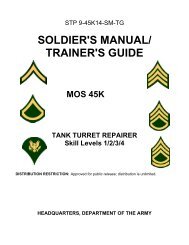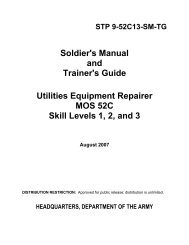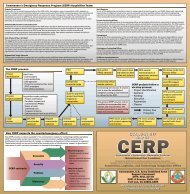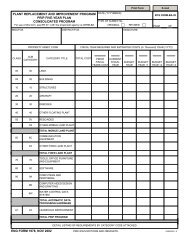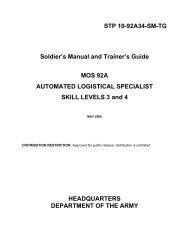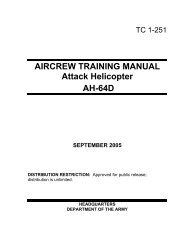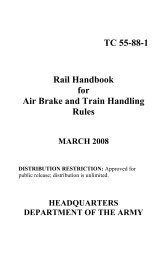- Page 1 and 2:
WARRIOR LEADER COURSEMODIFIED (MOD)
- Page 3 and 4:
INTRUCTOR / STUDENT C 1RECOVERABLE
- Page 5 and 6:
L231 Commandant’s Orientation, Ve
- Page 7 and 8:
TRAINING SUPPORT PACKAGE (TSP)TSP N
- Page 9 and 10:
This TSPContainsTABLE OF CONTENTSPA
- Page 11 and 12:
Student StudyAssignmentsBefore clas
- Page 13 and 14:
SECTION II.INTRODUCTIONMethod of In
- Page 15 and 16:
SECTION III.PRESENTATIONNOTE: Learn
- Page 17 and 18:
SECTION IV.SUMMARYMethod of Instruc
- Page 19 and 20:
Appendix A - Viewgraph Masters (N/A
- Page 21 and 22:
Appendix C - Practical Exercises an
- Page 23 and 24:
L232 Introduction to PLDC Version 2
- Page 25 and 26:
TRAINING SUPPORT PACKAGE (TSP)TSP N
- Page 27 and 28:
This TSPContainsTABLE OF CONTENTSPA
- Page 29 and 30:
Student StudyAssignmentsBefore clas
- Page 31 and 32:
SECTION II.INTRODUCTIONMethod of In
- Page 33 and 34:
SECTION III.PRESENTATIONNOTE:Inform
- Page 35 and 36:
thousands. Since this is not an MOS
- Page 37 and 38:
SHOW VGT-8, TRAINING BLOCK (continu
- Page 39 and 40:
During your introduction, include t
- Page 41 and 42:
SECTION V.STUDENT EVALUATIONTesting
- Page 43 and 44:
Appendix A - Viewgraph MastersVIEWG
- Page 45 and 46:
VGT-3, COMMON TASKSCOMMON TASKSTECH
- Page 47 and 48:
VGT-5, LEADERSHIP BLOCKLEADERSHIP B
- Page 49 and 50:
VGT-7, TRAINING BLOCKTRAINING BLOCK
- Page 51 and 52:
VGT-9, WARFIGHTING BLOCKWARFIGHTING
- Page 53 and 54:
Enabling Learning Objective BLearni
- Page 55 and 56:
Appendix B - Test(s) and Test Solut
- Page 57 and 58:
Appendix D - Student Handouts (N/A)
- Page 59 and 60:
T240 Suicide Prevention OCT 03U.S.
- Page 61 and 62:
U.S. ARMY SERGEANTS MAJOR ACADEMY (
- Page 63 and 64:
U.S. ARMY SERGEANTS MAJOR ACADEMY (
- Page 65 and 66:
C 1TRAINING SUPPORT PACKAGE (TSP)TS
- Page 67 and 68:
C 2This TSPContainsTABLE OF CONTENT
- Page 69 and 70:
C 1References Number Title Date Add
- Page 71 and 72:
C 1SECTION II.INTRODUCTIONMethod of
- Page 73 and 74:
C 1InstructionalLead-InThe Soldier
- Page 75 and 76:
SHOW VGT-2, GOAL OF THE ARMY SUICID
- Page 77 and 78:
REMOVE VGT-4Now we will watch a TVT
- Page 79 and 80: REMOVE VGT-5SHOW VGT-6, SUICIDE POT
- Page 81 and 82: SHOW VGT-8, SUICIDE IMMEDIATE DANGE
- Page 83 and 84: C 2C. ENABLING LEARNING OBJECTIVEAC
- Page 85 and 86: leaders who make the effort to know
- Page 87 and 88: SHOW VGT-14, CONTINUITY OF CARECont
- Page 89 and 90: C 2Installation gatekeepers are ind
- Page 91 and 92: also important not to use demograph
- Page 93 and 94: Review /SummarizeLessonSHOW VGT-19,
- Page 95 and 96: VIEWGRAPHS FOR LESSON 1: T240 versi
- Page 97 and 98: VGT-3, Chief of Staff of the Army S
- Page 99 and 100: Enabling Learning Objective BLearni
- Page 101 and 102: VGT-7, Suicide Potential "Triggers"
- Page 103 and 104: VGT-9, Suicide Warning SignsSuicide
- Page 105 and 106: VGT-11, Prevention BarrierPreventio
- Page 107 and 108: VGT-13, Secure BarrierSecure Barrie
- Page 109 and 110: C 2Enabling Learning Objective DLea
- Page 111 and 112: VGT-17, First Line Supervisors/Lead
- Page 113 and 114: VGT-19, SummarySummarySuicide Preve
- Page 115 and 116: Appendix B Test(s) and Test Solutio
- Page 117 and 118: Appendix D, HANDOUTS FOR LESSON 1:
- Page 119 and 120: Student Handout 1Advance SheetLesso
- Page 121 and 122: Student Handout 2ARMY SUICIDE PREVE
- Page 123 and 124: Headquarters, Department of the Arm
- Page 125 and 126: HeadquartersDepartment of the ArmyW
- Page 127 and 128: Chapter One - Introduction“A lead
- Page 129: disorders occur throughout society
- Page 133 and 134: 2-6. Reasons for DyingTo the “wel
- Page 135 and 136: These signs signal that the person
- Page 137 and 138: Chapter Three - The Army Suicide Pr
- Page 139 and 140: psychiatric therapy (for non-fatal
- Page 141 and 142: potential suicidal “triggers” a
- Page 143 and 144: Chapter Five - InterventionThe only
- Page 145 and 146: 5-3a. Soldiers & Army Employees. Al
- Page 147 and 148: should chair the standing committee
- Page 149 and 150: Chapter Six - Secure6-1. SafeguardT
- Page 151 and 152: Chapter Seven - Post-intervention M
- Page 153 and 154: Annex A - Strategy MatrixesSTRATEGY
- Page 155 and 156: STRATEGY 3: Raising Awareness and V
- Page 157 and 158: STRATEGY 4: Synchronizing, Integrat
- Page 159 and 160: Annex B - ChecklistsThe following c
- Page 161 and 162: Annex C - Suicide Risk Comparison o
- Page 163 and 164: Annex D - Definitions.Anxiety disor
- Page 165 and 166: Protective factors - factors that m
- Page 167 and 168: Annex E - Abbreviations/AcronymsAAF
- Page 169 and 170: Annex F - References1. Healthy Peop
- Page 171 and 172: Army Suicide DemographicsSuicide ca
- Page 173 and 174: Student Handout 3This Student Hando
- Page 175 and 176: SH-3-2
- Page 177 and 178: SH-3-4
- Page 179 and 180: SH-3-6
- Page 181 and 182:
SH-3-8
- Page 183 and 184:
SH-3-10
- Page 185 and 186:
SH-3-12
- Page 187 and 188:
SH-3-14
- Page 189 and 190:
SH-3-16
- Page 191 and 192:
T224 Physical Fitness OCT 03U.S. AR
- Page 193 and 194:
U.S. ARMY SERGEANTS MAJOR ACADEMY (
- Page 195 and 196:
U.S. ARMY SERGEANTS MAJOR ACADEMY (
- Page 197 and 198:
U.S. ARMY SERGEANTS MAJOR ACADEMY (
- Page 199 and 200:
U.S. ARMY SERGEANTS MAJOR ACADEMY (
- Page 201 and 202:
U.S. ARMY SERGEANTS MAJOR ACADEMY (
- Page 203 and 204:
C 2TRAINING SUPPORT PACKAGE (TSP)TS
- Page 205 and 206:
C 3This TSPContainsTABLE OF CONTENT
- Page 207 and 208:
C 4References Number Title Date Add
- Page 209 and 210:
C 2ProponentLesson PlanApprovalsNam
- Page 211 and 212:
C 2group in the extended rectangula
- Page 213 and 214:
SHOW VGT-2, PHYSICAL FITNESS TRAINI
- Page 215 and 216:
C 3SHOW VGT-4, COMPONENTS OF FITNES
- Page 217 and 218:
C 3SHOW VGT-5, PRINCIPLES OF EXERCI
- Page 219 and 220:
SHOW VGT-6, FLEXIBILITYFLEXIBILITYF
- Page 221 and 222:
The soldier should not limit flexib
- Page 223 and 224:
NOTE: Refer the students to Fig 1-1
- Page 225 and 226:
85 percent. As an example, let’s
- Page 227 and 228:
SHOW VGT-10, CRITERIA FOR AN AEROBI
- Page 229 and 230:
about 70 percent HRR. When soldiers
- Page 231 and 232:
F. ENABLING LEARNING OBJECTIVEACTIO
- Page 233 and 234:
type training. You have to train at
- Page 235 and 236:
CHECK ON LEARNING: QUESTION: What i
- Page 237 and 238:
SECTION IV.SUMMARYMethod of Instruc
- Page 239 and 240:
Appendix A - Viewgraph MastersVIEWG
- Page 241 and 242:
VGT-3, Physical Fitness Training Pr
- Page 243 and 244:
Enabling Learning Objective CLearni
- Page 245 and 246:
VGT-7, Stretching TechniquesA-7
- Page 247 and 248:
VGT-9, Training Heart RateA-9
- Page 249 and 250:
VGT-11, Examples of Aerobic Activit
- Page 251 and 252:
Appendix B Test(s) and Test Solutio
- Page 253 and 254:
Appendix B Test(s) and Test Solutio
- Page 255 and 256:
C 3STUDENT RANK & NAME(Last, First,
- Page 257 and 258:
C 3Appendix C Practical Exercises a
- Page 259 and 260:
C 3PRACTICAL EXERCISE SHEET PE 1Tit
- Page 261 and 262:
STUDENT RANK & NAME(Last, First, MI
- Page 263 and 264:
Appendix D, HANDOUTS FOR LESSON 1:
- Page 265 and 266:
Student Handout 1Advance SheetLesso
- Page 267 and 268:
Extracted Material from AR 350-1Stu
- Page 269 and 270:
equipment training plans are develo
- Page 271 and 272:
(6) Personnel who initially fail th
- Page 273 and 274:
Extracted Material from FM 21-20 w/
- Page 275 and 276:
FM 21-20C1HEADQUARTERSCHANGE 1 DEPA
- Page 277 and 278:
*Figure 14-1 (continued)14-4
- Page 279 and 280:
*Figure 14-1 (continued)14-6
- Page 281 and 282:
SUPERVISIONThe APFT must be properl
- Page 283 and 284:
800-YARD SWIMFigure 14-10Administra
- Page 285:
(THIS PAGE INTENTIONALLY LEFT BLANK
- Page 289 and 290:
PrefaceOn 5 July 1950, U.S. troops,
- Page 291 and 292:
plan special training to help soldi
- Page 293 and 294:
through sound, progressive, mission
- Page 295 and 296:
day” approach is used. For exampl
- Page 297 and 298:
Persons who have not been active,es
- Page 299 and 300:
should use ability group runs rathe
- Page 301 and 302:
will be enforced. Next, they should
- Page 303 and 304:
and set a good example, these leade
- Page 305 and 306:
Cardiorespiratory (CR) fitness,some
- Page 307 and 308:
INTENSITYIntensity is related to ho
- Page 309 and 310:
As shown, the percentage (70 percen
- Page 311 and 312:
TIMETime, or duration, refers to ho
- Page 313 and 314:
areas promote unit cohesion and tea
- Page 315 and 316:
LAST-MAN-UP RUNNINGThis type of run
- Page 317 and 318:
off, wash and dry their feet, andli
- Page 319 and 320:
such training may not improve runni
- Page 321 and 322:
improve performance in racket sport
- Page 323 and 324:
The nature of the eccentric contrac
- Page 325 and 326:
Whichever RM range is selected,the
- Page 327 and 328:
Workout TechniquesWorkouts for impr
- Page 329 and 330:
performer by restricting the number
- Page 331 and 332:
Figure 3-4Figure 3-5
- Page 333 and 334:
Key Points to EmphasizeSome key poi
- Page 335 and 336:
3-14
- Page 337 and 338:
3-16
- Page 339 and 340:
3-18
- Page 341 and 342:
3-20
- Page 343 and 344:
3-22
- Page 345 and 346:
3-24
- Page 347 and 348:
Exercises Performed with anExercise
- Page 349 and 350:
3-28
- Page 351 and 352:
3-30
- Page 353 and 354:
3-32
- Page 355 and 356:
3-34
- Page 357 and 358:
3-36
- Page 359 and 360:
BALLISTIC STRETCHINGBallistic, or d
- Page 361 and 362:
4-4
- Page 363 and 364:
4-6
- Page 365 and 366:
4-8
- Page 367 and 368:
4-10
- Page 369 and 370:
4-12
- Page 371 and 372:
PASSIVE STRETCHESPassive stretching
- Page 373 and 374:
Soldiers can do PNF (Proprioceptive
- Page 375 and 376:
Body composition, which refers toth
- Page 377 and 378:
In addition to exercise, proper nut
- Page 379 and 380:
Figure 6-36-2
- Page 381 and 382:
Figure 6-46-4
- Page 383 and 384:
protein to promote better musclegro
- Page 385 and 386:
time, number of stations, number of
- Page 387 and 388:
Figure 7-17-4
- Page 389 and 390:
Figure 7-37-6
- Page 391 and 392:
Progression and RecoveryOther impor
- Page 393 and 394:
7-10
- Page 395 and 396:
7-12
- Page 397 and 398:
7-14
- Page 399 and 400:
7-16
- Page 401 and 402:
Figure 7-4Performing grass drills c
- Page 403 and 404:
Figure 7-57-20
- Page 405 and 406:
forward at your waist, and pump you
- Page 407 and 408:
● “Platoon halt.”● “From
- Page 409 and 410:
Figure 7-87-26
- Page 411 and 412:
landing areas should be raked andre
- Page 413 and 414:
Obstacles for Vertical Climbing and
- Page 415 and 416:
Obstacles for BalancingBeams, logs,
- Page 417 and 418:
White GroupThis group contains the
- Page 419 and 420:
Black GroupThis group contains the
- Page 421 and 422:
Figure 8-13Figure 8-14Figure 8-158-
- Page 423 and 424:
Right-Shoulder Position, Move left
- Page 425 and 426:
LOG-DRILL EXERCISESThe following ar
- Page 427 and 428:
Exercise 5. Half-Knee BendStart Pos
- Page 429 and 430:
Figure 8-218-20
- Page 431 and 432:
ending the knees. Then, straightena
- Page 433 and 434:
echelons should be made for at leas
- Page 435 and 436:
Figure 9-1Figure 9-29-4
- Page 437 and 438:
a standard football field. The othe
- Page 439 and 440:
up across the field separated by th
- Page 441 and 442:
authority during play. Otherwise, t
- Page 443 and 444:
all, is used. The players need nopa
- Page 445 and 446:
for coded location markers, which a
- Page 447 and 448:
Figure 9-9leave the assembly area a
- Page 449 and 450:
devise a timed land-navigation even
- Page 451 and 452:
Adapting to differingenvironmental
- Page 453 and 454:
FROSTBITEFrostbite is the freezing
- Page 455 and 456:
Most injuries can beprevented by de
- Page 457 and 458:
Extracted Material from FM 3-21.5St
- Page 459 and 460:
FM 3-21.5front of and one step outs
- Page 461 and 462:
T221 Risk Management OCT 03U.S. ARM
- Page 463 and 464:
U.S. ARMY SERGEANTS MAJOR ACADEMY (
- Page 465 and 466:
U.S. ARMY SERGEANTS MAJOR ACADEMY (
- Page 467 and 468:
C 1TRAINING SUPPORT PACKAGE (TSP)TS
- Page 469 and 470:
C 2This TSPContainsTABLE OF CONTENT
- Page 471 and 472:
C 1Student StudyAssignmentsBefore c
- Page 473 and 474:
C 2SECTION II.INTRODUCTIONMethod of
- Page 475 and 476:
InstructionalLead-InIn every combat
- Page 477 and 478:
NOTE: Have students turn to SH-2, p
- Page 479 and 480:
B. ENABLING LEARNING OBJECTIVEACTIO
- Page 481 and 482:
Ref: FM 100-14, pp 2-2 thru 2-7A ha
- Page 483 and 484:
You accomplish Step 3 in two subste
- Page 485 and 486:
C 2assess variable hazards such as
- Page 487 and 488:
awareness on the part of all leader
- Page 489 and 490:
As you can see, the consequences ca
- Page 491 and 492:
Lapses in individual discipline can
- Page 493 and 494:
SECTION IV.SUMMARYMethod of Instruc
- Page 495 and 496:
Appendix A - Viewgraph MastersVIEWG
- Page 497 and 498:
VGT-3, Risk Management Does Not—A
- Page 499 and 500:
VGT-5, Two Types of RisksA-5
- Page 501 and 502:
VGT-7, Risk Management Process Step
- Page 503 and 504:
VGT-9, Risk Management Process Step
- Page 505 and 506:
Enabling Learning Objective CLearni
- Page 507 and 508:
VGT-13, Effects of Fratricide (Cont
- Page 509 and 510:
VGT-15, Causes of Fratricide (Cont)
- Page 511 and 512:
Appendix B - Test(s) and Test Solut
- Page 513 and 514:
Appendix C Practical Exercises and
- Page 515 and 516:
C 2PRACTICAL EXERCISE 1TitleLesson
- Page 517 and 518:
RISK MANAGEMENT WORKSHEETA. Mission
- Page 519 and 520:
SOLUTION FORA. Mission or Task:B. D
- Page 521 and 522:
This appendix contains the items li
- Page 523 and 524:
STUDENT HANDOUT 1Advance SheetLesso
- Page 525 and 526:
Extract Material from FM 100-14Stud
- Page 527 and 528:
Chapter 1Risk Management Fundamenta
- Page 529 and 530:
FM 100-14during training exercises.
- Page 531 and 532:
FM 100-14Force DesignConcerns inclu
- Page 533 and 534:
FM 100-14CONSTRAINTSRisk management
- Page 535 and 536:
FM 100-14Risk Management StepsMilit
- Page 537 and 538:
FM 100-14Hazards are sources of dan
- Page 539 and 540:
FM 100-14Terrain. The five main mil
- Page 541 and 542:
FM 100-14time can result in shortag
- Page 543 and 544:
FM 100-14SELDOM (D) Remotely possib
- Page 545 and 546:
FM 100-14experience, and judgment.
- Page 547 and 548:
FM 100-14ammunition caches will cri
- Page 549 and 550:
FM 100-14Examples of Controls. Exam
- Page 551 and 552:
FM 100-14STEP 4. IMPLEMENT CONTROLS
- Page 553 and 554:
FM 100-14• Capture and disseminat
- Page 555 and 556:
FM 100-14Pitfalls arise when risk m
- Page 557 and 558:
Risk ManagementThe work sheet (Figu
- Page 559 and 560:
Appendix-4Figure A-4. Example of Co
- Page 561 and 562:
Extract Material from FM 3-20.98Stu
- Page 563 and 564:
13Appendix IFratricide Prevention57
- Page 565 and 566:
___________________________________
- Page 567 and 568:
___________________________________
- Page 569 and 570:
___________________________________
- Page 571 and 572:
___________________________________






